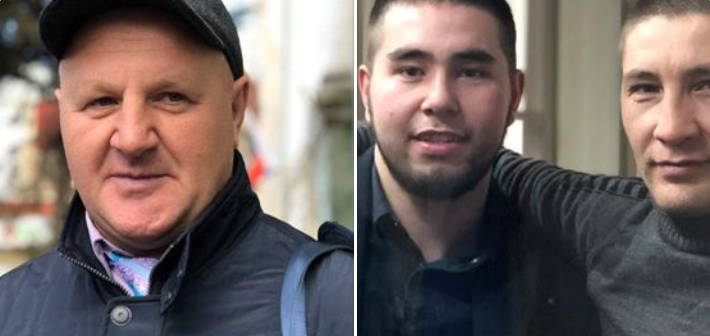• Topics / Human Rights Abuses in Russian-occupied Crimea
Outbreak of Covid-19 in Russian prison holding Ukrainian prisoners of conscience

Cases have been reported of Covid-19 in the Russian SIZO or remand prison in Rostov-on-Don where at least three Ukrainian political prisoners are currently held. All Russian SIZOs are notoriously filthy, unsanitary and overcrowded, meaning that the prisoners are without any protection against the potentially deadly virus. Russia is now endangering the lives of three men - Crimean Tatars Eskender Abdulganiev and Arsen Abkhairov, and Ukrainian Jehovah’s Witness Serhiy Filatov who are all imprisoned solely for their faith.
While it is doubtless necessary that the entire SIZO should be placed under strict quarantine, Russia’s manipulation or downright concealment of information about the spread of coronavirus makes it of immense concern that even the men’s lawyers will have no access to them.
Russia has ignored all calls, including international, to release prisoners, especially the large number of political prisoners held in intolerable conditions, regardless of their age and poor state of health. There is particular concern about the ongoing detention of 58-year-old Crimean Tatar civic activist Dzhemil Gafarov who is suffering from advanced kidney failure and, even according to Russian legislation, should not be imprisoned and Russian historian of Stalin’s Terror, Yuri Dmitriev. The world-renowned historian who discovered the mass graves of Russians, Ukrainians and others at Sandarmokh, has been imprisoned on preposterous charges for over three years and, like Gafarov, is in very real danger.
At 47, Filatov is the most senior of the three Ukrainian political prisoners, and has only just arrived in Rostov after what was quite likely a gruelling journey in appalling conditions from Crimea.
The father of four from Dzhankoy is the first Ukrainian to be sentenced in Russian-occupied Crimea to six years’ imprisonment solely for practising his faith. Russian banned the Jehovah’s Witnesses in April 2017 and is now illegally foisting its religious persecution on occupied territory.
Filatov was sentenced to six years on 5 March 2020 by ‘judge’ Maria Yermakova, from the Dzhankoy District Court, and significant other restrictions. Filatov was found to have prayed, together with others, in his own home, which the Russian-controlled prosecutor and court chose to view as “undermining constitutional order and state security”. He was charged under Article 282.2 § 1 of Russia’s criminal code which punishes for something termed ‘organization of the activities of an extremist organization.” That sentence was upheld on 26 May by ‘judge’ Edward Belousov, of the Crimean High Court. While it is near definite that the European Court of Human Rights will find that Filatov’s rights have been violated, this is likely to take a long time, and Russia is clearly planning to flout another ECHR judgement by imprisoning Filatov in the Russian Federation, far from his family and home.
Eskender Abdulganiev and Arsen Abkhairov
At 22, Abdulganive is the youngest of all Russia’s Ukrainian political prisoners. He and 32-year-old Abkhairov were arrested on 14 February 2019, together with Rustem Emiruseinov (40), who is now in a different Russian SIZO.
During the ‘operation’ on 14 February 2019, armed and masked men burst into homes where children were sleeping, and carried out ‘searches’ during which they planted at least one religious book.
The men are now ‘on trial’ in Rostov, although they are not charged with having committed, or even planned, any recognizable crime. The men are charged solely with unproven involvement in Hizb ut-Tahrir. This peaceful Muslim organization is legal in Ukraine and most countries and is not known to have committed any acts of terrorism anywhere. Russia is literally the only country in the world to call the organization ‘terrorist’, and the relevant Supreme Court judgement in 2003 was held secret until it was too late for it to be appealed. Vitaly Ponomaryov, from the renowned Memorial Human Rights Centre, believes that the judgement was politically motivated and passed to make it easier for Russia to extradite people to Uzbekistan where they faced religious persecution and torture.
Since 2015, Russia has been illegally using such ‘terrorism’ charges against Crimean Tatar and other Ukrainian Muslims in occupied Crimea. In each such ‘trial’, one or more of the defendants are designated the role of ‘organizer’, while the others are accused of taking part in the Hizb ut-Tahrir group allegedly ‘organized’ by the other defendants. In this case, Emiruseinov is facing the worse charge under Article 205.5 § 1 of Russia’s criminal code (‘organizing’ a group which Russia has claimed is terrorist) with this carrying a sentence of up to life imprisonment. Abkhairov and Abdulganiev face the slightly lesser charge of ‘involvement’ (Article 205.5 § 2) with this carrying a sentence of from 10 to 20 years.
Emiruseinov is one of a very large number of Crimean Tatar civic activists or journalists who are imprisoned essentially because they could not look away as repression mounted under Russian occupation and took part in the Crimean Solidarity civic initiative. He actively attended ‘court hearings’ in the cases of political prisoners and also took part in the online flash-mob entitled ‘Muslims are not terrorists’. This followed the series of single-person pickets in October 2017, after 76-year-old Server Karametov was imprisoned for 10 days after standing in defence of political prisoners with a placard reading: ‘Putin, our children are not terrorists!’. When asked by Krym.Realii whether her husband had been involved in Crimean Solidarity, Aliye Emiruseinova asked a counter-question: “Can you tell me how it is possible in Crimea to not be involved in Crimean Solidarity if you have a conscience?”
See: Crimean Tatar political prisoners face surreal terrorism charges that the prosecutor can’t explain





